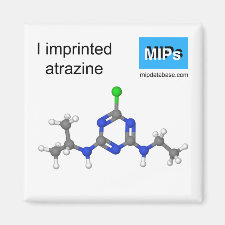
Authors: Mosalam M, Billing J
Article Title: Removal of Atrazine Herbicide from Contaminated Water Using Molecularly Imprinted Nano-polymer.
Publication date: 2016
Journal: Egyptian Journal of Chemical and Environmental Health
Volume: 2
Issue: (2)
Page numbers: 490-499.
Alternative URL: http://cehea.org/wp-content/uploads/2017/01/43-.pdf
Abstract: In the present work, molecularly polymeric nanoparticles were synthesized by miniemulsion polymerization procedure using Atrazine (ATZ) as imprinting molecule. Three different monomers and two different crosslinkers were investigated. The MIPs obtained were subsequently characterized in detail with rebinding investigation by HPLC-DAD UV. The results indicated that the polarity of both monomer and crosslinker play an important role for affinity and retention behavior to ATZ. The affinities of the polymers to ATZ increased with the decreasing polarity of crosslinker. It is illustrated that the monomer is much more important than the crosslinker, and that the hydrophobic interaction and π-π interaction between analytes and the MIP play a key role in the release process. This work focuses on synthesis of nano-particles and application of toxic contaminant material in water purification and using miniemulition polymerization method. Molecularly imprinted nanospheres (nanoMIPs) adsorbent for micropollutants were prepared using non-covalent templating technique. MIP nanoparticles has particle size about 140 nm were synthesized in toluene by using ATZ as a template, Itaconic acid (ITA) as functional group, and EDMA as the crosslinker polymer. The efficiency of the non-covalent molecular imprinting was examined by rebinding experiments and quantified by HPLC-UV. When compared with the non-imprinted polymer, the MIP shows an excellent affinity towards ATZ in the aqueous solution with imprinted factor (IF) 4.15 and the maximum capacity was about 20μg/mg.
Template and target information: atrazine, ATZ
Author keywords: molecularly imprinted polymer (MIP), Atrazine (ATZ), Nano-polymer



Join the Society for Molecular Imprinting

New items RSS feed
Sign-up for e-mail updates:
Choose between receiving an occasional newsletter or more frequent e-mail alerts.
Click here to go to the sign-up page.
Is your name elemental or peptidic? Enter your name and find out by clicking either of the buttons below!
Other products you may like:
 MIPdatabase
MIPdatabase









